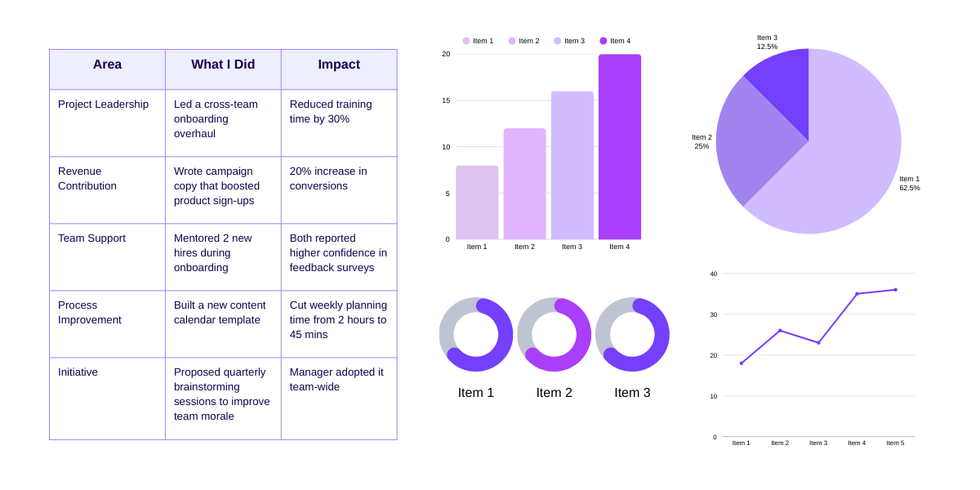Asking for a promotion is one of those things nobody really teaches you, like how to fold a fitted sheet or cancel plans without sounding like a monster. You know you should do it…eventually. You just don't want to come off as greedy, needy, or the office version of someone who texts “wyd” at 2 a.m.
But, unfortunately, promotions don’t (usually) fall out of the sky. Most of the time, you’ve got to ask. And when you do it the right way — at the right time, with the right receipts — you don’t just look overly ambitious. You look prepared. Professional. Like someone who knows their worth and isn’t afraid to say it out loud.
If you’ve been doing the work, picking up extra projects, or solving problems before your boss even sees them, this guide’s for you. We’ll walk through when to ask, what to say, how to back it up, and what to do if the answer is “not right now.”
Know the right time to ask
When you ask for a promotion matters just as much as how you ask. Bring it up too early and you risk looking out of step. Wait too long, and you might miss your chance. The key is to pay attention to your performance, your manager’s feedback, and the company’s rhythm.
Here’s what “good timing” looks like in real life:
- You’ve been crushing it lately. Not just showing up but solving problems, making your team’s life easier, and getting things across the finish line.
- You’ve taken on responsibilities that aren’t in your job description, and nobody had to ask you twice.
- Your boss has been handing you stretch projects (big ones, visible ones), and you’ve delivered.
- You’ve hit your one-year mark in the role (or whatever’s typical for your company or industry).
- Your manager has said things like, “You’re really stepping up,” or “I could see you in a leadership role one day.”
Here are a few scenes that signal it’s a good time to bring it up:
Scene 1: Post-project glow-up
You just wrapped a six-week campaign that brought in 20% more customer sign-ups than expected. Your manager’s been singing your praises in meetings. That’s your window.
💬 Try this: “I’ve really enjoyed leading this project and seeing such a strong outcome. I’d love to talk about what growth might look like from here.”
Scene 2: Annual review season
Your company’s performance reviews are coming up. Everyone’s reflecting, planning, and setting goals. It’s very literally the moment designed for these conversations (and typically aligned with budgets!).
💬 Try this: “With review season around the corner, I’ve been thinking a lot about my growth path. Could we set aside time to talk about what it would take for me to move into [next role]?”
Scene 3: You’re doing two jobs, but still paid for one
You’ve been unofficially overseeing a small team since your manager went on leave. You didn’t complain. In fact, you handled it like the boss you are. And the team’s thriving.
💬 Try this: “I’ve taken on a lot of responsibility over the past few months, especially with leading the team. I’d like to talk about aligning my title and compensation with the work I’m doing.”
Of course, some moments are less than ideal. Don’t shoot your shot during a budget crisis, five minutes before your boss’s vacation, or while they’re visibly fighting with the printer. (Give it a beat.)
Read this next: 5 workplace skills to get promoted in 2025
Prep your case: What to bring to the table
Before you ask for a promotion, you need your receipts. Not literal ones (unless your job involves expense reports) but some tangible proof that you’ve earned it. This is the part of the process where you show your work.
Start with a list. Think back over the last 6 – 12 months and write down:
- Projects you led
- Problems you solved
- Metrics you improved
- Ideas you pitched that actually got used
- Times you helped your team or manager do their job better
For example, instead of “I helped launch the new onboarding process,” try:
💬 Try this: “I created and led a new onboarding process that cut training time by 30% and improved first-month retention by 15%.”
Make it as easy as possible for your manager to see the value you’re adding, even if you think they know already. Think like them: What would make me say yes to a promotion if I were the one approving it?
If you’re not sure how to organize all of this, start a “brag doc.” It doesn’t have to be fancy. Just a running list (in a Google Doc or Notes app or whatever works) of the wins you want to remember. Pull from it when you prep for your conversation. This can also include emails or chats with compliments from your stakeholders and is a great ego boost, promotions aside!
And if you’ve been taking on work that lines up with the role you want next? Even better.
Let’s say you’re a content writer aiming for a senior title. Have you mentored junior writers? Created style guides? Stepped in to manage projects? That’s the stuff you’ll want to highlight.
For example:
💬 Try this:“Over the last six months, I’ve taken on more leadership by mentoring two junior writers, reviewing their work, and helping them hit deadlines. I’ve also led two cross-team projects that improved our content production timeline by a week.”
Your goal here is to be crystal clear about your impact on the team.
Watch this next: Asking For That Promotion: Tips & Tricks to Landing Your Next Big Role
But wait! What about your confidence?
If you ask me, this is the hardest part of asking for a promotion.
Having “the conversation” can feel like you’re doing something dramatic, like pulling a stunt in the middle of your company Slack. But, trust me, asking for a promotion is not bold…or rude…or even too much. It’s totally normal.
This is how you grow your career. Promotions aren’t handed out like coupons in the newspaper. They’re (usually) sparked by someone (that’s you) raising their hand and saying, “Hey, I’ve grown. I’m ready for more.”
And that’s not weird, we promise that’s the whole point! According to Nectar HR, 63% of the workforce has received a promotion within the past two years, which should feel encouraging that promotions are a common aspect of career progression.
Most managers don’t expect you to stay in the same role forever. If they’re good at their jobs, they want to see you stretch, lead, and take on more. You asking for a promotion tells them you’re invested and that you’re not just clocking in. You’re thinking long-term! That’s helpful information, not a nuisance.
If you’re nervous about how it might come off, remember this: Managers aren’t mind readers. They might think you’re perfectly happy where you are. The only way they’ll know you’re ready for something more is if you say it out loud.
And saying it out loud doesn’t make you greedy or annoying. It makes you a person with goals. If anything, it shows initiative, self-awareness, and respect for your own time and effort.
So, repeat after me: “I am not out of line. This is not uncalled for. Promotions are totally normal, and I deserve this.”
Now, let’s get into how to actually ask for it.
How to ask for a promotion
While it likely won’t ever feel amazing to ask for more money and a new title, there are ways to approach the conversation that make you sound clear, confident, and prepared…and not like you're winging it during your coffee refill.
68% of professionals who have asked for a promotion have received one, according to Namely, so take a deep breath and remember that initiating the conversation is, more often than not, effective.
To start, keep in mind some basic do’s and don’ts:
✅ Do:
- Be direct. No need to drop hints or speak in riddles. Say what you want.
- Lead with value. Show how your work connects to team or company goals.
- Back it up. Use metrics, projects, or impact — whatever proves your point.
- Practice. Out loud. To your dog, your mirror, or a very patient friend.
- Stay open. Promotions don’t always happen on your timeline, but a thoughtful ask can spark the right conversations.
🚫 Don’t:
- Make it personal. “I need more money because my rent went up” might be true, but it’s not a reason your company will promote you.
- Compare yourself to coworkers. Focus on your work, not what Karen in marketing is (or isn’t) doing.
- Ultimatum your way through it. Threats rarely lead to positive outcomes.
- Apologize. You’re not doing anything wrong by advocating for yourself.
Sample scenarios
Ready for the convo? Pick the one below that fits your situation. Use it as-is or tweak it to sound like you. The point isn’t to memorize a script but rather walk in with a basic idea of what you want to say.
If you’re in a one-on-one
Let’s say it’s your regular check-in with your manager. You’ve done your prep, and you’ve got your wins ready. The vibe’s good.
💬 Try this: “I’d love to talk about my future here. Over the past few months, I’ve taken on [brief example], led [another example], and delivered [result]. I’m interested in growing into [next role], and I’d like to understand what steps I can take to get there.”
Why it works: It’s clear, shows your value, and opens the door for a real conversation — not a yes/no request.
If you’re starting with an email
This is helpful if your manager likes a heads-up, or if you want to plant the seed before a deeper conversation.
💬 Try this: Subject: Time to talk about my growth?
Hi [Manager’s Name],
I’ve been reflecting on my work over the past [X months], and I’d love to talk about what growth might look like for me here. I’ve taken on [project or responsibility], contributed to [result], and I’m excited about what’s next.
Could we set aside time this week or next to talk about a potential promotion and what steps would make the most sense?
Why it works: You’re flagging the conversation without blindsiding them. Gives them time to think and prepare.
If you’ve been turned down before
Let’s say you brought this up a few months ago and heard some version of “not yet.” That’s not a no; it’s a ‘not right now’. Here’s how to revisit it.
💬 Try this: “Thanks again for our last conversation about my growth path. Since then, I’ve focused on [feedback area], taken on [new work], and delivered [results]. I’d love to check in and see if we can revisit the conversation about a promotion.”
Why it works: You’re showing growth (not holding a grudge). Since you’ve done the work, it’s time to follow up.
Read this next: The New Normal for Women in the Workplace: 3 Tips to Get Promoted at Work
What to do if the answer is “not yet”
Let’s say you bring your A-game. You lay out your case and deliver the ask like a pro. And then your manager says something that’s not “no”… but also not quite yes.
Take a breath. You didn’t fail (we promise!). You started the conversation, and that’s progress.
“Not yet” can mean a few things. Maybe there’s a promotion freeze or your manager needs more time to advocate for you. Maybe they want to see a few more things first. None of those are a shut door. Think of them more like a hallway.
Here’s how to handle it without spiraling:
1. Ask for specifics
Wanting clarity doesn’t make you difficult. You’re being smart.
💬 Try this: “Thanks for the feedback. Can you walk me through what steps I should take to move toward that next role?”
2. Get the roadmap
If there are gaps between where you are and where you want to go, name them. Set a timeline. Put check-ins on the calendar.
💬 Try this: “Would it be helpful to revisit this in three months? I can focus on [specific area] in the meantime.”
3. Keep receipts
As you make progress, track it. That way, when you circle back, you’ve got proof that you hit every mark.
4. Stay visible
Don’t retreat. Stay engaged, keep doing strong work, and keep looking for chances to lead, even informally. Your response to “not yet” is part of what your manager will remember when it is time.
However, keep in mind that sometimes, “not yet” might really mean “not ever, not here.” If that’s the vibe you’re getting, it’s okay to start looking around. In fact, workers who switched jobs and moved to a new company saw an average earnings jump of 11%, according to a LendingTree analysis. Don’t stay in a place that doesn’t value your work and contributions.
But, let’s not jump ship just yet! If there’s a path forward, this is your chance to walk it with purpose and a game plan.
TL;DR: You’re not asking for a favor
So don’t treat it that way!
You wanting to grow is ultimately helping the company grow, so own it.
Promotions aren’t magic, and they don’t just happen. You have to ask for them. And when you do it with clarity, preparation, and good timing, you show that you’re serious about your work and your future.
Know your value. Build your case. Say it out loud.
Worst case? You start a conversation that sets the stage for next time.
Best case? You get the title, the raise, and the recognition you’ve already earned.
Either way, you’re moving forward. And that’s the whole point.







